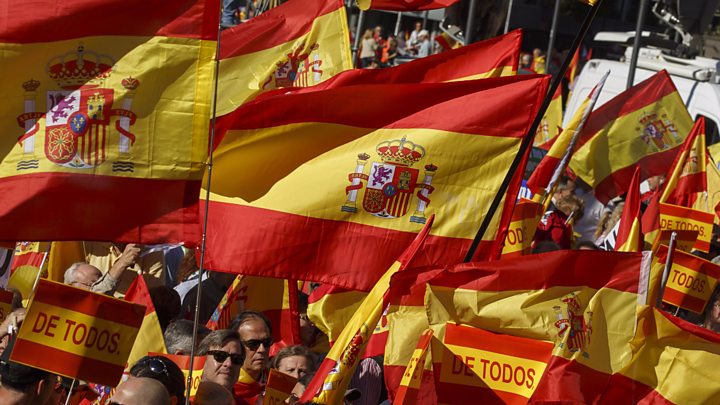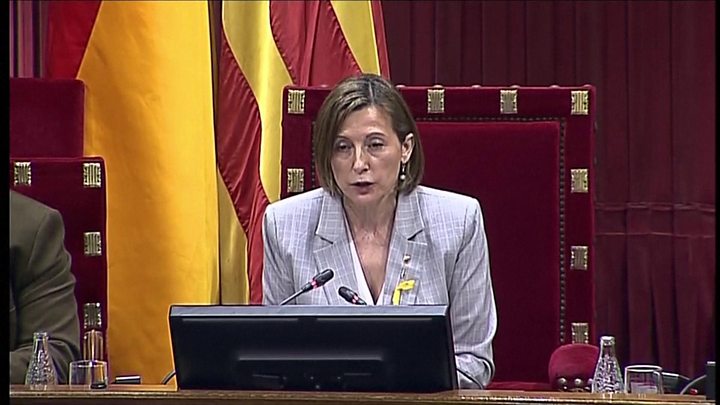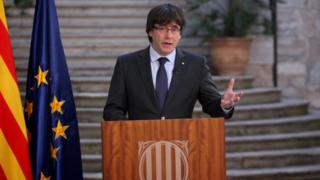Catalan ex-leader Carles Puigdemont vows to resist takeover
Sacked Catalan leader Carles Puigdemont has called for "democratic opposition" to direct rule from Madrid.
He condemned the suspension of Catalonia's autonomy and promised to continue to "work to build a free country".
He made the call in a pre-recorded TV address to Catalans broadcast on Saturday afternoon.
The Spanish government has stripped Catalonia of its autonomy and taken charge of its government.
The measures came early on Saturday after the Catalan parliament voted to declare independence the previous day.
- Madrid's enforcer for Catalonia
 Media playback is unsupported on your device
Media playback is unsupported on your deviceAnd Spain's interior ministry has taken charge of Catalonia's police after firing senior Catalan police officials.
Friday saw Spanish Prime Minister Mariano Rajoy announce the dissolution of the regional parliament and the removal of Mr Puigdemont as Catalan leader, and order fresh regional elections in December.
An official state bulletin (in Spanish) handed control of Catalonia to Spain's Deputy Prime Minister, Soraya Saenz de Santamaria.
Demonstrations for and against independence went on into the night, and a large rally "for the unity of Spain and the constitution" was held in Madrid on Saturday.
- Barca coach ducks Catalan questions
- Catalonia crisis: What next for Spain?
- EU risks "more cracks" appearing
In his TV address, Mr Puigdemont, describing the declaration of independence, said Friday had been "a day with democratic and civic sensibility".
He said the central government's actions since then were "premeditated aggression" that ran "contrary to the expressed will of the citizens of our country, who know perfectly well that in a democracy it is parliaments that choose, or remove, presidents".
He added: "We continue persevering in the only attitude that can make us winners. Without violence, without insults, in an inclusive way, respecting people and symbols, opinions, and also respecting the protests of the Catalans who do not agree with what has decided the parliamentary majority."
 Media playback is unsupported on your device
Media playback is unsupported on your deviceMeanwhile, the Spanish government has said it would welcome the participation of Mr Puigdemont in new elections in the region in December.
A Spanish government spokesperson, Íñigo Méndez de Vigo, said that despite his removal from office, the separatist leader had the right to continue in politics.
"The Catalans will be able to say what they feel about what they've been seeing in this last year, with all sorts of failing the law, abusing the law and putting themselves outside the law," the spokesman added.
The crisis was sparked by an independence referendum organised by the Catalan government and held earlier this month in defiance of a ruling by the Constitutional Court which had declared it illegal.
The Catalan government said that of the 43% of potential voters who took part, 90% were in favour of independence.
What powers did Catalonia have?
Before Madrid took over the Catalan government, the region had one of the greatest levels of self-government in Spain.
It has its own parliament, police force and public broadcaster, as well as a government and president, though those have now been dismissed.
Catalans had a range of powers in many policy areas from culture and environment to communications, transportation, commerce and public safety.
Foreign affairs, the armed forces and fiscal policy were always the sole responsibility of the Spanish government.
- What powers has Catalonia now lost?
- The case for and against independence
What's the reaction been?
Thousands celebrated the declaration of independence on the streets of Barcelona, Catalonia's regional capital.
The same crowds that cheered each Yes vote from Catalan MPs reportedly booed Mr Rajoy as he made his announcement.
There were pro-unity demonstrations too, with protesters in Barcelona waving Spanish flags and denouncing Catalan independence. A large pro-unity rally is expected in Madrid on Saturday.
In other reaction:
- Barcelona's mayor Ada Colau condemned the move by Madrid, but also criticised Catalan pro-independence parties for "advancing at a kamikaze pace…after their mistaken reading of the results of the Catalan elections"
- EU President Donald Tusk said Madrid's government "remains our only interlocutor" in Spain, but called for restraint
- The UK government said it did not recognise the declaration of independence by Catalonia.
How did we get here?
After the 1 October referendum, Mr Puigdemont signed a declaration of independence but delayed implementation to allow talks with the Spanish government.
He ignored warnings by the Madrid government to cancel the move, prompting Mr Rajoy to first announce his plans to remove Catalan leaders and impose direct rule.
- Does Catalonia want to leave Spain?
- Reality Check: Police violence in Catalonia
Catalonia is one of Spain's richest, most distinctive regions, with a high degree of autonomy.
Many Catalans feel they pay more to Madrid than they get back, and there are historical grievances, too, in particular Catalonia's treatment under the dictatorship of General Franco. But Catalans have been divided on the question of independence.
Catalonia in numbers
16% of Spain's population live in Catalonia, and it produces:
25.6% of Spain's exports
19% of Spain's GDP
20.7% of foreign investment
Ministry of Economy, Industry and Competitiveness, Eurostat, Bank of Spain Getty
Are you in Catalonia? What is your reaction to the latest developments? You can share your views and experience by emailing [email protected].
Please include a contact number if you are willing to speak to a BBC journalist. You can also contact us in the following ways:
- WhatsApp: +44 7555 173285
- Send pictures/video to [email protected]
- Upload your pictures / video here
- Tweet: @BBC_HaveYourSay
- Text an SMS or MMS to 61124 (UK) or +44 7624 800 100 (international)
Or use the form below

